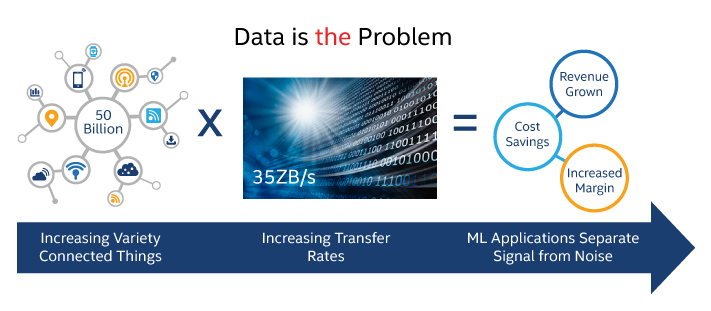
Machine learning, at the highest level, is a program that extracts specific features from data to solve predictive problems. A few example include: detecting anomalies to prevent network intrusion or fraud, classifying objects such as tumors or detecting pedestrians, scanning social media sentiment and perception for marketing purposes, self-driving cars, or evaluating traffic patterns to forecast and make decisions to control the flow in an optimal way.
Machine learning applications cross all vertical markets from military, automotive, industrial, and data center. Imagine a person trying to rank each web search manually every time someone issues a web search; it is an impossibility for a person, but machines do it billions of times a day. This job is exactly where machines can help humans. Machines can navigate through the tsunami of data collected every second and automatically recognize complex patterns. Then, they can make intelligent decisions based on this insight. For accuracy, models must be trained, tested, and calibrated to detect patterns using previous experiences.

Today, one of the most popular machine learning methods is using neural networks for object detection and recognition. Neural networks are modelled after the brain’s interconnected neurons and use a variety of layers that extract lower levels of detail for each layer in the network. The FPGA implements these layers very efficiently because the FPGA has the ability to retrieve the data and perform classification in real time. By leveraging 8 TBps of on-die memory bandwidth and minimizing the need to interact with external memory, designers can leverage the flexible FPGA architecture to obtain very power efficient implementations. FPGAs can also efficiently move data in and out of the network directly to classify in-line video, signal, or packet processing.
Register for Tekedia Mini-MBA edition 19 (Feb 9 – May 2, 2026): big discounts for early bird.
Tekedia AI in Business Masterclass opens registrations.
Join Tekedia Capital Syndicate and co-invest in great global startups.
Register for Tekedia AI Lab: From Technical Design to Deployment (next edition begins Jan 24 2026).
At Fasmicro, we are an authorized Intel FPGA partner and will be happy to teach you ML on Intel Altera chips.

